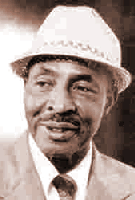 Miguel Archangel Conill Conill (Pinar del Río, May 8 1917 Havana, March 13, 1984) better known as Miguelito Cuni, was a singer of Cuban music. It was one of the iconic voices are in the 40s to 60.
Miguel Archangel Conill Conill (Pinar del Río, May 8 1917 Havana, March 13, 1984) better known as Miguelito Cuni, was a singer of Cuban music. It was one of the iconic voices are in the 40s to 60.
Born in Pinar del Rio, the westernmost province of the island of Cuba, in a humble family. During his school days he devoted himself to the practice of small trades to help support the family. In 1932, at fifteen, he started as a vocalist in the group “The Carameleros”. Soon, he was vocalist Lira Septet The Septet Charity and other groups in his province.
From 1938, and in Havana, he became part of the set of Arsenio Rodríguez, and actively worked with the orchestras “Melodies 40” Arcano y sus Maravillas, making recordings and live performances and radio.
During the forties he developed an intense artistic life, he spent two years in Panama and in 1949 settled in New York, as director of the orchestra of trumpeter Felix Chappottín.
He worked with Cuban music icons like Beny Moré and in 1956 traveled to Caracas to work with the “King of Rhythm” with the whole “tribe”. In 1960 he returned to New York, where he made several presentations, including the famous “Palladium”.
He returned to Cuba in 1966 where he founded his own group. He participated in the film “We the music” and other documentaries. Some of the tunes that reached popularity in his voice were With skill is broken, There is no love without charity, Old Sarcastic, We’re moving, Canallón, Okra, I do like wildfire, Ay what Canuto, Now you see Champion, Fairy na ‘ma, Mi are my are my are, Alto Songo, Mount Canto, Cuban pineapple knife, Serving bat mountain walks and light the fire, breaks Saragüey, Convergence,’s protest Baraguá, All dancing with the Guajira Cardenas, Guachinango, the coal, among others, most recorded with the set Chappottín and Stars, a group with which he achieved great projection and which sang until his death.
He died on March 13, 1984 at the Hermanos Ameijeiras Hospital in Havana.
Agencies/Various/Wiki/InternetPhotos/youtube/thecubanhistory.com
The Cuban History, Hollywood.
Arnoldo Varona, Editor.



